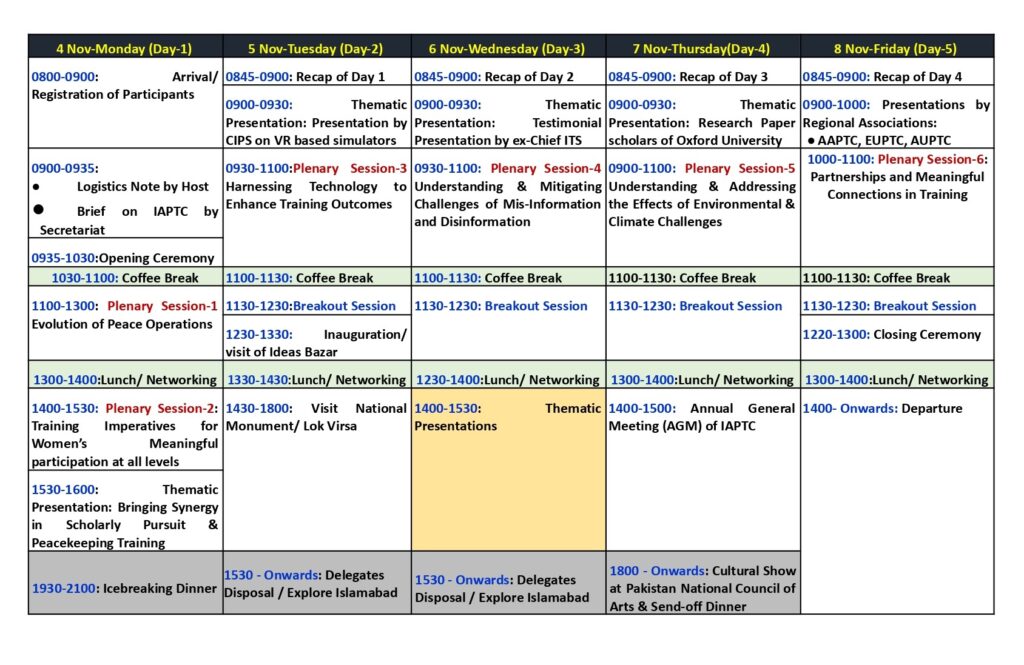Conference Details


NATIONAL FLAG OF PAKISTAN
Flag of Star and Crescent is a green field with a white crescent moon and five-rayed star at its center and a vertical white stripe at hoist side. Crescent and Star which is traditional symbol of Islam symbolizes progress and light respectively. The flag symbolizes Pakistan’s to both majority populace of Islamic faith as well as rights of minority populace of all faiths.

PAKISTAN NATIONAL MONUMENT
The monument represents Pakistani unity and solidarity. The flower shaped monument is based on Mughal architecture with four main petals for the four provinces – Punjab, Balochistan, Sindh and Khyber Pakhtunkhwa and three smaller petals for the territories - Gilgit Baltistan, Azad Jammu and Kashmir.

WHITE DOVE
Doves usually white in colour, are used in many settings as symbols of peace, freedom or love. Doves appear in the symbol of Judaism, Christianity, Islam and paganism, and of both military and pacifist groups.
RED & BLUE
Red and Blue represent the theme colours for International Association of Peacekeeping Training Centers (IAPTC).
DATE & VENUE
4 th to 8th November, 2024 at Center for International Peace & Stability (CIPS), NUST, Islamabad.
THEME
Adaptive Training Strategies for Evolving Peace Operations.
Concept Note
The International Association of Peacekeeping Training Centres (IAPTC) stands as a beacon of collaboration and knowledge exchange among centers, institutions and programs dedicated to advancing peace operations research, education and training. Since its inception on July 22, 1995, IAPTC has remained committed to fostering a deeper understanding of peace operations, its objectives and the methodologies essential for effective training. With a membership of all leading Peacekeeping Training Institutes and Organizations, IAPTC continues to serve as a pivotal force in shaping the landscape of peacekeeping training.
The upcoming 28th IAPTC Annual Conference heralds a new chapter in the association’s journey, set amidst the vibrant backdrop of Islamabad, Pakistan. Scheduled to take place from November 4th to 8th, 2024, this 5-day gathering promises to unite delegates hailing from diverse corners of the globe. As tradition dictates, the conference serves as a cornerstone for cooperation, offering a platform for crucial updates, insightful briefings, and the exchange of invaluable knowledge on peace operations.
Conference Objectives
Under the theme ‘Adaptive Training Strategies for Evolving Peace Operations,’ the 28th IAPTC Conference underscores the pressing need to adapt training methodologies to meet the evolving demands of contemporary peacekeeping endeavors. Delegates will delve into multifaceted discussions, exploring innovative approaches to address the complexities inherent in modern peace operations environments. A highlight of the event will be the IDEAS Bazaar, where participants can showcase and exchange groundbreaking concepts, projects, and methodologies, fostering collaboration and the sharing of best practices among peacekeeping professionals.
With objectives spanning the developing understanding about evolving peace operations, exchange of best practices, the promotion of training standards and the cultivation of collaborative networks, the 28th IAPTC Conference aspires to catalyze meaningful dialogue and action. As delegates converge in Islamabad, they bring with them a shared commitment to advancing peace and security on a global scale.
In partnership with esteemed institutions and governmental bodies, including the Ministry of Defence of Pakistan, the conference will explore a wide spectrum of topics pertaining to Evolving Peace Operations, Harnessing Technology to enhance Training and Fostering Partnerships. The event will also dig deeper into critical topics such as addressing impediments to women’s contributions and effects of Climate Change & Mis/ Disinformation on peace operations.
Conference Design
The 28th IAPTC Conference program is meticulously crafted around a series of plenary, breakout and thematic sessions, each designed to foster rich discourse and actionable insights. Moderated by experienced Subject Matter Experts, these sessions provide a platform for speakers to share their expertise and experiences while delving into complementary perspectives of the theme. Emphasizing concision, focus and thought-provoking insights, speakers are encouraged to provide added value to the discussions. Assigned moderators play a pivotal role in coordinating content, outlining desired outcomes and facilitating interaction between speakers, ensuring a seamless flow of dialogue.
At the core of the conference design lies a commitment to participant interaction and inclusion. Thematic sessions offer diverse formats for engagement including plenary discussions, interactive sessions, and syndicate discussions catering to varying learning preferences. Breakout sessions will enable participants to engage deeply with specific topics in smaller groups, promoting detailed discussions and practical solutions. Methodologies range from straightforward presentations to discussion-based approaches and storytelling, addressing the diverse needs of attendees. Moreover, the conference design allows for follow-up exchanges, fostering continued dialogue and collaboration beyond the formal sessions as well as provides sufficient opportunity to explore beauty and culture of Islamabad. As professional educators and trainers, the IAPTC upholds high ambitions for participant engagement, striving to create an inclusive and enriching conference experience for all attendees.
Conclusion
The 28th IAPTC Conference will stand as a testament to the collective commitment of the international community to advancing peace and security through effective training and collaboration. As delegates depart from Islamabad, Pakistan, they will carry with them a wealth of insights, perspectives and actionable strategies gleaned from engaging discussions and fruitful interactions. The conference will serve as a catalyst for continued progress in peace operations’ training, empowering participants to drive positive change within their respective institutions and contribute to the broader goals of international peacekeeping efforts. With a renewed sense of purpose and strengthened networks, delegates will leave the conference equipped to address the evolving challenges of peace operations and work towards a more peaceful and secure world, while also having experienced the vibrant culture and hospitality of Islamabad and Pakistan.

